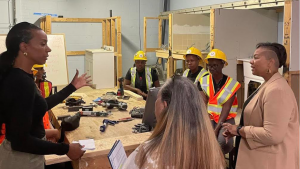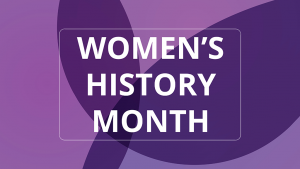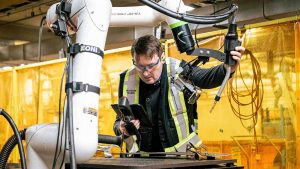Despite millions in government funding poured into creating trade programs for women, women wanting to enter the trades face an uphill battle finding funding, let alone exploratory or introductory courses that might be free.
There exists limited financial support for serious learning courses with foundation courses costing up to $5,000 and specialized equipment courses $10,000. B.C. and Alberta have two NGO organizations vaulting the major barriers and putting dollars and support behind women wanting to train.
“That’s pretty well what we do – we remove the barriers,” said Karen Dearlove, executive director of the BC Centre for Women in Trades Training (BCCWITT). BCCWITT provides full support such as paying for the course plus cost of tools and personal protection gear, which can cost $1,000. Dearlove said she can spend up to $5,000 per individual on training, equipment, travel and even childcare costs.
Dearlove said the application form is online for easy and clear access.
“We don’t want to add to the barriers for those wanting to access the program,” she said, adding the BCCWITT takes an individual’s application and determines the best path for training and a job. Post-training support is also offered.
“We want to get women into trades and make sure they are remaining in the trades,” she said.
Dearlove said the whole process of attempting to get into the trades can be intimidating and there is the need to expand services such as BCCWITT to better support women. She can only handle 100 women a year. She wants to reach out to more women, including looking at those who may have been marginalized (incarcerated or substance abuse rehabilitated).
BCCWITT receives funding through B.C.’s Industry Training Authority (ITABC), and administration support from the B.C. Federation of Labour.
Alberta has two strong organizations: Women Building Futures (WBF) and emPower, an Alberta manpower organization that put funding in the hands of women.
“We think we are quite unique,” said WBF president Carole Moen.
It is a position that BuildForce Canada agrees with on its website calling WBF a leader in its field. WBF provides comprehensive financial and other supports for women, has an Edmonton training centre and cultivates and maintains strong industry links. The program has drawn attention from beyond Alberta’s borders. WBF is looking to supply 200 trades women to B.C.’s LNG Kitimat project, Moen said.
“We have been successful with employer sponsored programs where the cost of training is borne by the employer. There are other programs that we have held throughout Alberta and we have received funding from the federal government to run these programs,” said Moen. In 2019, WBF received $10 million in federal funding over four years. Once trained, their earning power is 2.5 times previously earnings.
WBF’s strength is strong partnerships with 40 employers, and it make the application process easy. Applicants go through a screening process to ensure seamlessly integrate into an employer’s workforce. It is a process that works as the company counts those hired and not bodies passing through classrooms. Moen said that within six months of completing training, 90-95 per cent of WBF trainees are gainfully employed.
emPOWER: Women in Trades is a Manpower Alberta Program no-cost government funded training program which partners with the Southern Alberta Institute of Technology (SAIT) to help unemployed or marginally employed women gain access to trades training. The program supplies skills training and support to secure entry-level employment.
The ITABC, funded provincially, offers almost a dozen educational institutions with women in trades training courses available. But, it is difficult to find which ones are free or funded. A general query to the ITA website regarding sponsored courses returned an email stating: “You will need to contact the service providers directly for details on what supports they provide.” ITABC media person Angela Osborne said via email that “some programs offer more than just an exploration of trades and they provide wraparound supports like transportation, resume building, and other materials people would need in getting a start on their trades careers.”
One ITABC service provider Thompson Rivers Universities Women in Trades Training does clearly spell out the funding support provided and the eligibility criteria on its website. Others on the ITA list simply cycle one to a general website and the individual must search for information, which is often non-existent or limited in detail.
Another ITA facility is B.C.’s largest trade school Okanagan College which has a gateway Women in Trades program offering funded 12-week exploration in trade courses to eligible women. However, to gain access to the offered five-month foundation courses, individuals must first gain a seat and pay a seat deposit before applying for Women in Trades funding, said Kristen Diehl, marketing and recruitment for the program. If funding is turned down and the individual can’t find the fee for the courses, the seat deposit is forfeited. A carpentry foundation course can cost $4,400.
“A very high percentage of women who actively engage in the application process though, are sponsored. Student loans are certainly an option for most people as well,” Diehl said.
Women’s construction or trade organizations can be a place to look for money, but it is spotty. Manitoba Women in �鶹��ý����ion (MWC) has received funding in the past and put women through courses at a regional college. Its’ website offers a 33-week pre-apprentice welding course at a college with tuition, books and tools paid for 24 students with the dollars coming from the federal government. “The welding pre-apprentice program funding was actually provided by the federal government earlier this year and the application period has now passed,” an email MWC’s communications coordinator Alyssa Malenchak said.
Lack of funding information to get women into trades emphasizes what individuals like Moen see as a lost opportunity during the pandemic. There is a need for more federal support for women.
“If you look at who is unemployed in the midst of COVID, 65-70 per cent are women,” she said. “It is more important than ever to get women earning above minimum wage today.”











Recent Comments
comments for this post are closed